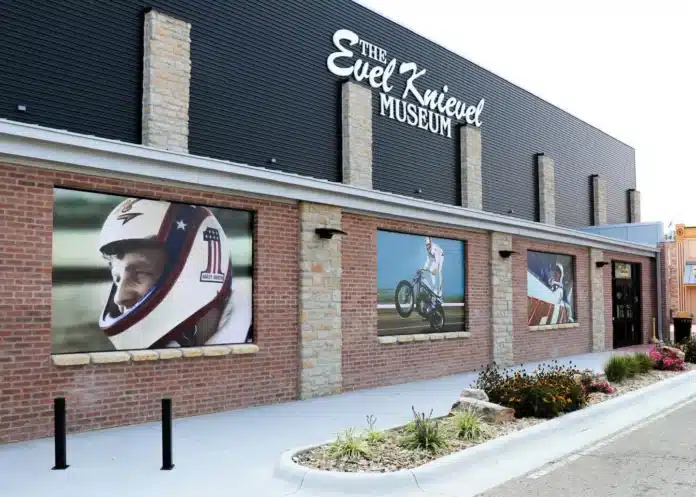The Evel Knievel Museum, a tribute to the iconic stunt performer and a celebration of American pop culture, is set to relocate from its current home in Topeka, Kansas, to Las Vegas, Nevada. This news has sent ripples through the local community, sparking discussions about the implications of the museum’s move and the broader trends affecting business retention in Topeka. As businesses like the Evel Knievel Museum leave for bigger cities, questions arise: Is this a city problem caused by attracting the wrong types of businesses, or is it indicative of a lack of community support?
The Evel Knievel Museum opened in Topeka in 2017, featuring an extensive collection of memorabilia, motorcycles, and interactive exhibits dedicated to the life and career of one of America’s most daring entertainers. The museum was seen as a significant draw for both local residents and tourists, but despite its cultural value, it struggled to gain traction in a city with a smaller population and limited tourism infrastructure.
Las Vegas, on the other hand, is a bustling metropolis known for its vibrant entertainment scene and deep pockets for tourism-related investments. The decision to relocate was influenced by the potential for increased visibility, larger visitor numbers, and better financial support in a city that thrives on tourism and spectacle. This move highlights a troubling trend for Topeka and its ability to retain businesses that could foster economic growth and cultural vibrancy.
Topeka’s struggle to retain businesses isn’t a new narrative. Over the years, many local enterprises have faced challenges that have driven them to either close their doors or relocate to larger cities like Kansas City and Wichita. Factors contributing to this trend include a combination of economic, demographic, and cultural elements.
Lack of Diversity in the Business Ecosystem
One significant issue is the lack of a diverse business ecosystem. Topeka has historically relied on a limited number of industries, which can stifle innovation and growth. While some new businesses have emerged, there is often a sense that they do not cater to the broader interests of the community or fail to attract outside visitors. When a business like the Evel Knievel Museum relocates, it raises questions about whether Topeka is effectively nurturing a business environment that can support unique attractions.
Moreover, community support plays a crucial role in the sustainability of local businesses. Residents often express a desire for unique offerings, yet patronage sometimes falls short. Many locals may prefer to travel to larger cities for entertainment, shopping, and dining experiences, leaving businesses in Topeka to struggle. The challenge lies not just in bringing in businesses but also in fostering a culture of support for those that already exist.
Furthermore, economic conditions, including job opportunities, wages, and local infrastructure, impact the community’s capacity to support businesses. A city with limited employment options may find it difficult to sustain a robust customer base for new ventures. As residents seek better opportunities elsewhere, the local economy suffers, creating a cycle that is hard to break.
The Role of Community Support
To address these issues, Topeka needs to take a multifaceted approach. Attracting diverse businesses and fostering a culture of community support are vital. This includes investing in marketing efforts that highlight local attractions, creating incentives for businesses that align with the community’s interests, and encouraging residents to engage more with local offerings.
In conclusion, the relocation of the Evel Knievel Museum is more than just the loss of a local attraction; it’s a reflection of Topeka’s ongoing struggle to retain businesses in an increasingly competitive landscape. The city faces the challenge of both attracting the right businesses and fostering a supportive community environment. By addressing these issues head-on, Topeka can work towards a more vibrant economic future that celebrates its unique character and encourages local engagement.
What are your thoughts on the Evel Knievel Museum’s relocation? How can Topeka better support its local businesses? Share your insights in the comments below!





